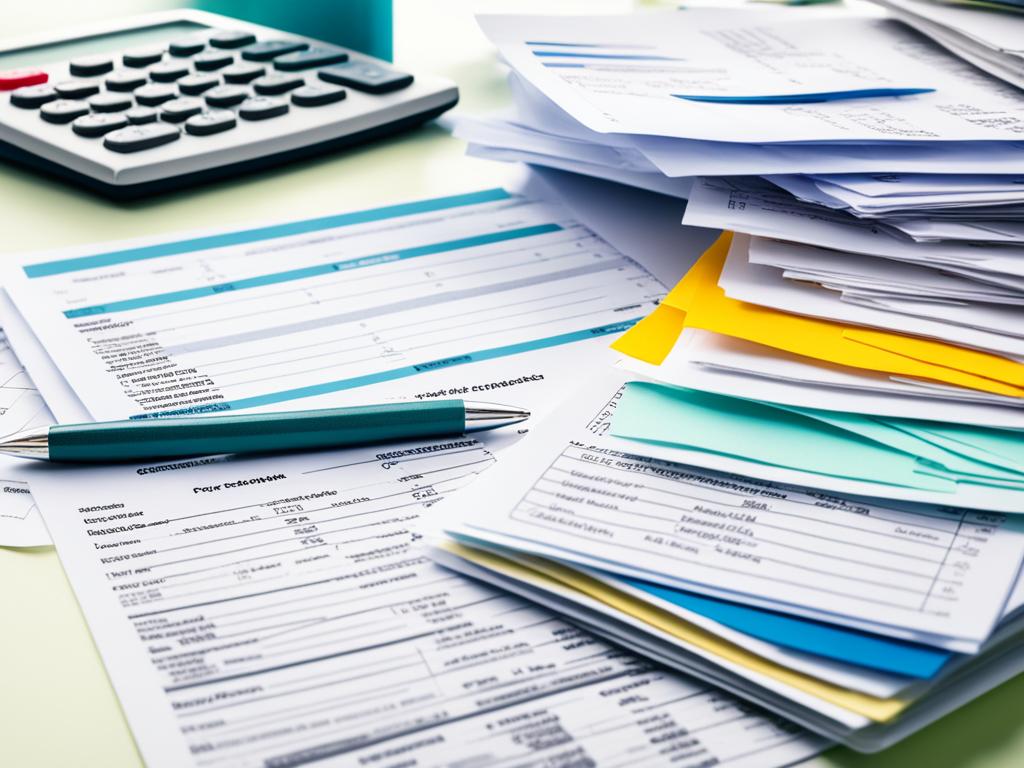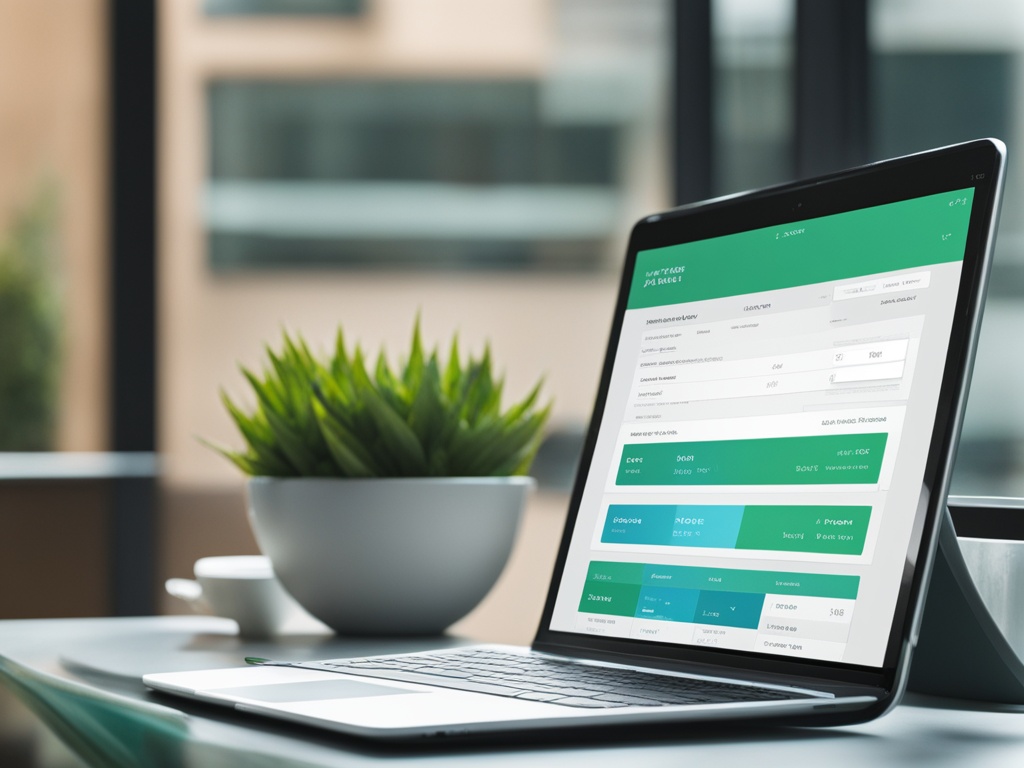
How to Simplify Your Taxes
Tax season can feel overwhelming, but it doesn’t have to be. With the right strategies and tools, you can make filing taxes easier and save more money. This guide will show you how to organize your finances and use deductions and credits to your advantage.
Whether you’re experienced with taxes or new to them, this article will help you. We’ll cover the basics of filing taxes and how to save money. By the end, you’ll know how to simplify your taxes and have a smooth tax experience.

By the end of this guide, you’ll have the knowledge and tools to manage your taxes better. You’ll learn how to maximize your deductions and credits and make filing taxes easier. Let’s start exploring ways to simplify your taxes and use your money wisely.
Taxes: Understanding the Basics of Tax Filing
Tax filing can seem overwhelming, but knowing the basics makes it easier. This guide covers the different types of tax returns and important deadlines. It aims to simplify your tax filing process.
Types of Tax Returns
The most common tax form is the Form 1040 for individuals. But, there are other forms for different situations. Businesses might use Form 1120 or Form 1065. Some individuals might use the 1040-EZ or 1040-SR.
Taxes – Key Deadlines and Filing Dates
It’s important to know tax deadlines to avoid penalties and stay compliant. The main filing deadline is April 15th, but it can change due to holidays or weekends. There are also different deadlines for things like extensions and specific tax returns.
| Tax Deadline | Applicable Returns |
|---|---|
| April 15th | Form 1040 (Individual), Form 1120 (Business) |
| January 15th | Estimated Tax Payments |
| October 15th | Tax Return Extensions |
Knowing about tax return types and deadlines helps you manage your taxes better. This way, you can follow tax laws and avoid issues.

Organizing Your Financial Records
Keeping your financial records in order makes tax filing simpler. By tracking your income, expenses, and financial info all year, you’ll find tax returns easier to do.
Taxes – Tracking Income and Expenses
Here are some tips for tax preparation by tracking your income and expenses:
- Keep a detailed financial records system, either digital or physical. This includes pay stubs, bank statements, and receipts.
- Use personal finance software or apps to automatically track your income and expenses all year.
- Check your income and expense reports often. This helps you spot deductions or credits you might be missing.
| Income Tracking | Expense Tracking |
|---|---|
| PaystubsBank StatementsInvestment Statements1099 Forms | ReceiptsCredit Card StatementsUtility BillsMortgage/Rent Payments |

By organizing your financial records well, tracking your income and expenses, and checking your reports, you’ll be ready for tax filing. This makes the process smoother and more accurate.
Taxes: Maximizing Tax Deductions and Credits
As tax season comes around, it’s key to know how to save on taxes with deductions and credits. These can lower your tax bill and put more cash in your pocket.
Common Tax Deductions
Tax deductions let you subtract certain expenses from your income, reducing your taxes. Here are some common ones:
- Mortgage interest on your main home and a second home
- Donations to qualified charities
- Medical expenses over 7.5% of your income
- State and local taxes, up to $10,000
- Business costs for those who work for themselves or own a small business
Taxes – Eligibility for Tax Credits
Tax credits directly reduce the tax you owe. Some top credits are:
- Earned Income Tax Credit (EITC): For those with lower to moderate incomes
- Child Tax Credit: Helps with child expenses
- American Opportunity Tax Credit: Covers higher education costs
- Saver’s Credit: For retirement savings of eligible individuals
Make sure to review your finances and see if you qualify for these tax deductions and tax credits. Planning ahead and using these can lessen your tax worries and save you money.

| Tax Deduction | Typical Amount | Eligibility Criteria |
|---|---|---|
| Mortgage Interest | Up to $10,000 | Homeowners with a mortgage on their primary residence or second home |
| Charitable Contributions | Unlimited (subject to certain limits) | Individuals who itemize deductions and make donations to qualified charitable organizations |
| Medical Expenses | Expenses exceeding 7.5% of AGI | Taxpayers with unreimbursed medical expenses that exceed the 7.5% threshold |
| State and Local Taxes | Up to $10,000 | Taxpayers who itemize deductions and pay state and local income or property taxes |
| Business Expenses | Varies | Self-employed individuals and small business owners with eligible business-related expenses |
Taxes: Tips and Strategies for Easier Filing
Dealing with tax preparation can feel overwhelming, but you can make it easier. Here are some tips to help you file your taxes smoothly.
Tax software is a great tool to use. It walks you through each step, helps you find deductions, and reduces mistakes. Plus, you can get advice from tax experts.
If you’re waiting for a tax refund, file your return early to get it faster. Also, think about direct deposit for quicker access to your money.
During a tax audit, stay calm and work together with the IRS. Collect all your documents, talk openly, and get help if you need it. Audits happen often, and you can get through it with the right steps.
| Tip | Benefit |
|---|---|
| Utilize tax software | Streamline the filing process and maximize deductions |
| File for tax refunds early | Receive your refund faster |
| Prepare for tax audits | Maintain calm and cooperation during the process |

Using these strategies can make tax filing less stressful. Stay informed and proactive for a smooth tax experience.
Conclusion
This guide has shown you how to make taxes easier. It covered the basics of filing taxes, keeping your finances in order, and using deductions and credits. Now, you’re ready to handle your taxes with confidence.
Staying organized and using the right resources is key to a stress-free tax season. You can do your taxes yourself or get help from a pro. Either way, the tips in this article will help you make smart choices and simplify your tax work.
Stay up to date with tax laws and use deductions and credits you’re eligible for. With the right tools and knowledge, you can reduce your tax worries and possibly increase your financial gains. Follow these strategies for a smoother and more rewarding tax experience.
FAQ
What is the deadline for filing my tax return?
Most people must file their tax returns by April 15th each year. This date can change if it falls on a weekend or holiday.
What documents do I need to prepare my tax return?
You’ll need your W-2 forms from work, 1099 forms, and records of income and expenses. Also, bring any documents for deductions or credits you’re claiming.
Can I file my tax return electronically?
Yes, most people file their taxes online. You can use software or a tax pro to do it for you. It’s faster and safer than filing on paper.
What are the most common tax deductions and credits?
Common deductions include mortgage interest, charity donations, and local taxes. Credits often go to the Earned Income Tax Credit, Child Tax Credit, and education expenses.
What should I do if I’m audited by the IRS?
Stay calm and gather all your documents if the IRS audits you. Work with a tax expert to answer their questions. Make sure you can prove your deductions and credits.
How can I maximize my tax refund?
Claim all deductions and credits you’re eligible for. File your return early and keep good records. Adjust your withholding or make payments throughout the year to avoid overpaying.
What is the difference between a tax deduction and a tax credit?
A deduction lowers your taxable income. A credit directly cuts the taxes you owe. Deductions reduce taxable income, while credits reduce the taxes you pay dollar-for-dollar.
Can I use tax software to file my return?
Yes, there are many tax software options, from free to paid. It can make filing easier, help you claim deductions and credits, and avoid mistakes.


